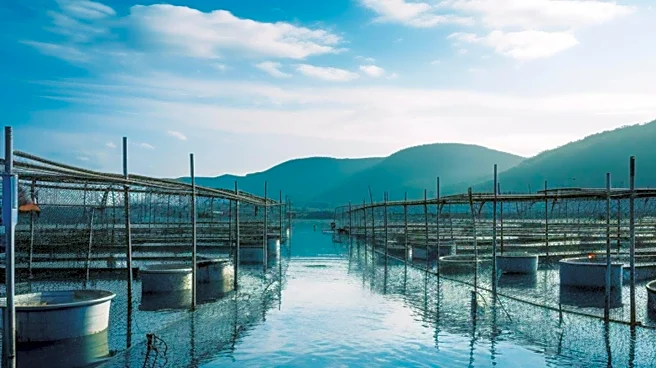What's Happening?
Farmed bivalves such as oysters, mussels, and clams are being considered as environmentally friendly food options due to their ability to clean polluted water. Researchers are exploring whether these bivalves can also capture carbon dioxide, potentially making them a sustainable food source. Bivalves are filter feeders that consume nutrients from seawater, helping to remove excess nitrogen and phosphorus pollution. Unlike farmed fish, bivalves do not require active feeding, which reduces pollution from fish excretions and uneaten food. However, the claim that farmed bivalves capture carbon is debated. Studies suggest that while bivalves may sequester carbon in sediments, the process of shell formation and waste shell incineration releases CO2, making them net emitters.
Why It's Important?
The debate over the carbon capture capabilities of farmed bivalves is significant in the context of global efforts to reduce greenhouse gas emissions. Food production is responsible for a substantial portion of these emissions, and identifying sustainable food sources is crucial. If farmed bivalves can be proven to capture carbon effectively, they could become a valuable tool in combating climate change. However, current evidence suggests that bivalve farming emits CO2, albeit less than other food sources like wheat or maize. This highlights the need for further research to accurately assess their environmental impact and potential benefits.
What's Next?
Further studies are needed to conclusively determine the carbon capture capabilities of farmed bivalves. Researchers may focus on improving measurement techniques and exploring alternative methods for shell disposal to minimize CO2 emissions. The ongoing debate may influence policy decisions regarding carbon credits for bivalve farms. Stakeholders in the seafood industry and environmental groups will likely continue to monitor developments in this area, potentially advocating for more sustainable practices in bivalve farming.
Beyond the Headlines
The discussion around farmed bivalves also touches on broader ethical and environmental considerations. Farming bivalves is less harmful to marine ecosystems compared to wild harvesting, which can damage seafloor life. This aspect of sustainability may drive consumer preferences towards farmed bivalves, promoting a shift in dietary habits. Additionally, the debate underscores the complexity of balancing food production with environmental conservation, highlighting the need for integrated approaches to address climate change.









